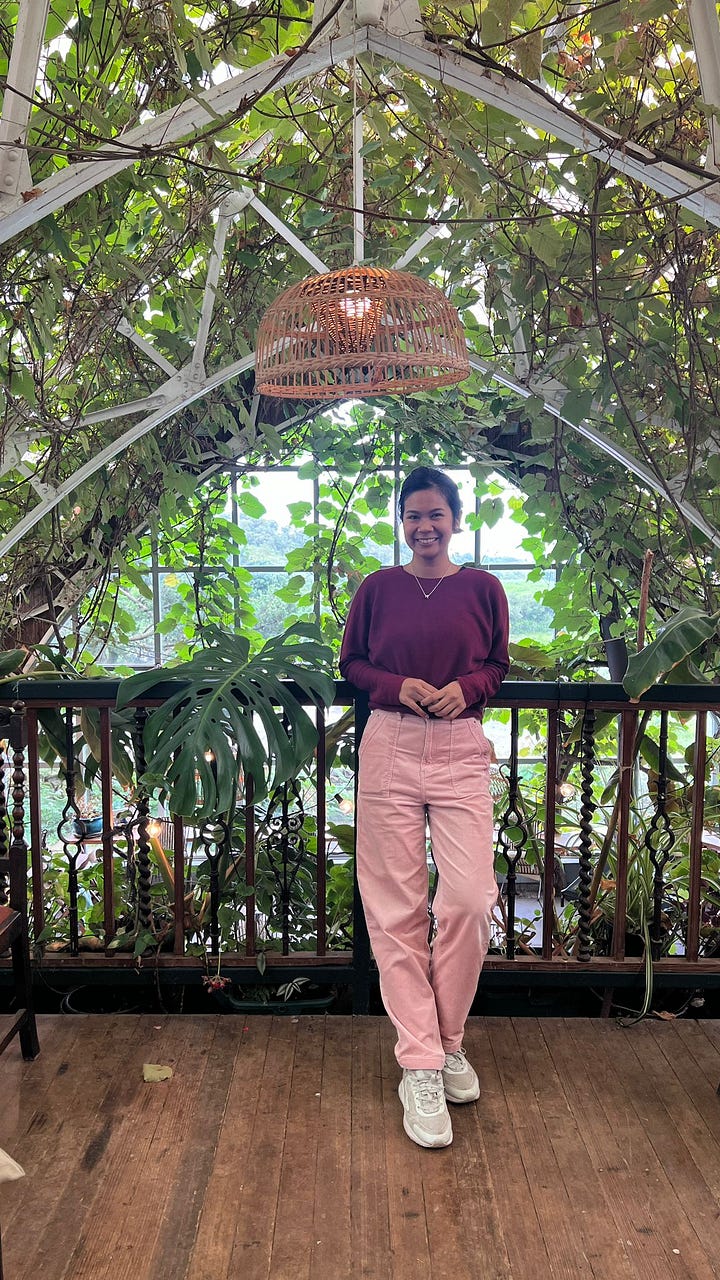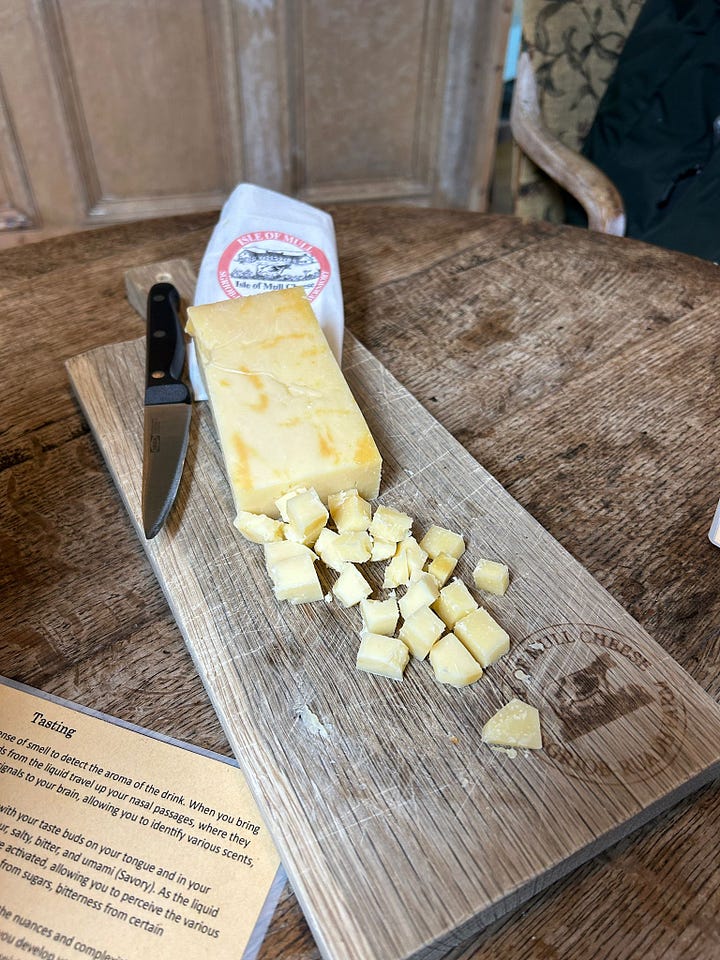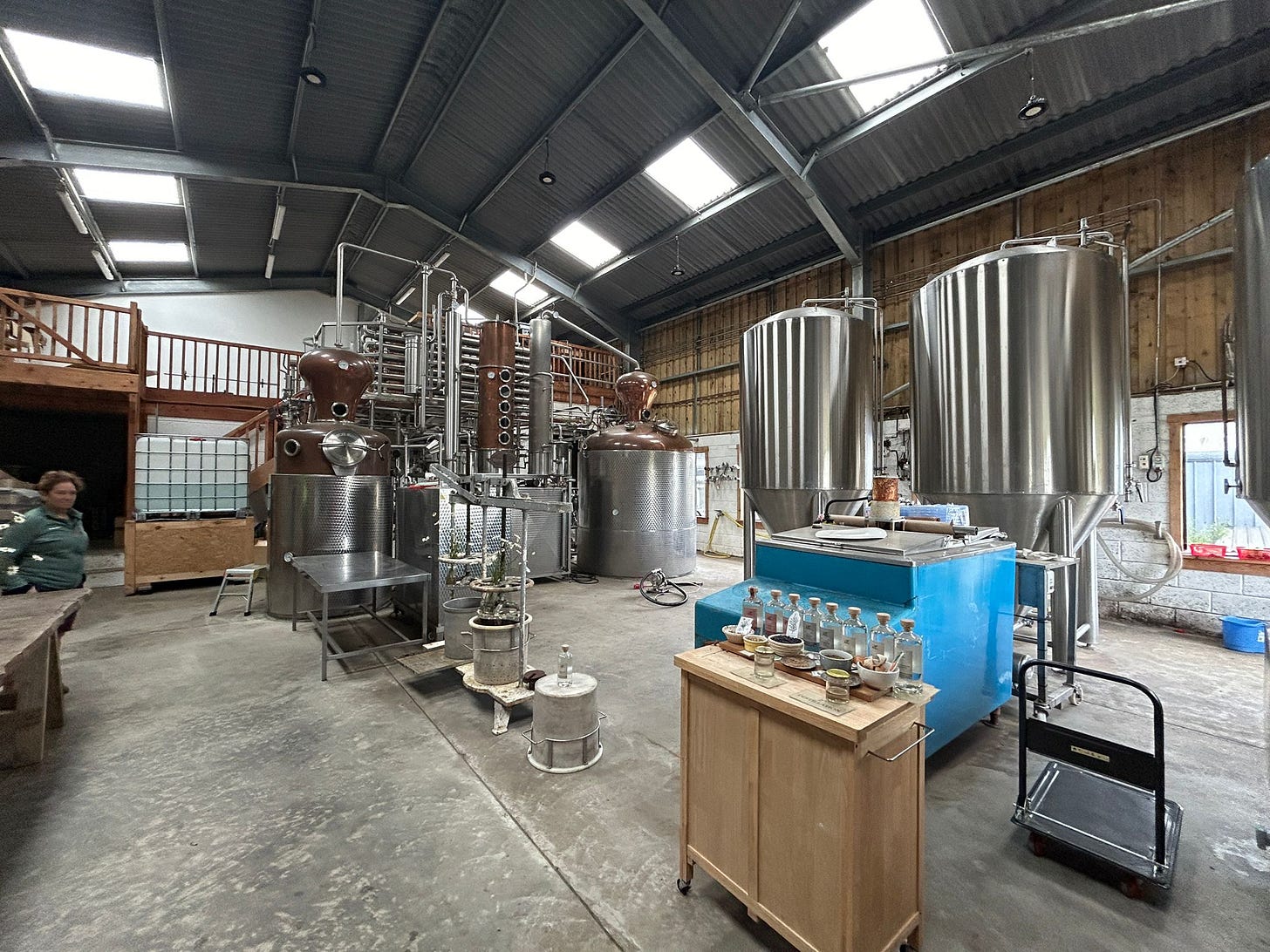🛒 The Check-Out: Isle of Mull Cheese & Distillery, at Sgriob-Ruadh Farm
+ 5 cool climate events + what's in our basket - Miniml, Papaya Reusables & more...
Happy Thursday! Welcome to The Check-Out - your weekly dose of climate x consumer goods inspiration, and your discovery box of products and events the Following the Footprints team are loving this week. It’s great to have you here.
A few weeks back, the FTF group chat was treated to a flurry of pictures from Indira. Why? She’d just been to the Isle of Mull to visit Sgriob-Ruadh Farm, where Isle of Mull Cheese is produced. She expected cheese…what she didn’t expect was a distillery utilising ‘waste’ whey, the farm to be powered by 100% renewable energy, a beautiful glass barn with furniture repurposed from a local hall and a fully family run business. There aren’t many brands as resourceful as Isle of Mull Cheese clearly is. As today is Earth Overshoot Day, it feels like the right time to take a closer look…
After Indira takes us on her tour, we’ll share what the Following the Footprints team has loved and consumed this week and 5 Climate x Consumer Goods events coming up. Let’s dig in…
> Brand Spotlight
Behind the Brand: Isle of Mull Cheese and Distillery, at Sgriob-Ruadh Farm
Hi! Indira here, FTF team member based in Glasgow. A few weeks ago, I visited the Isle of Mull on the west coast of Scotland. Whilst there are loads of reasons to visit this beautiful Inner Hebrides island, one particular cheese and spirits company (pronounced ‘Skrib-rooah’ and is Scottish Gaelic for Red/Brown Furrow) was mine. Only expecting to get a cheese tasting after signing up for their farm tour, what I found on my visit turned out to be far more fascinating. Let’s dig in…
What’s the story in Balamory Tobermory?
Located a 20 minute walk from the colourful town of Tobermory, the small family farm was founded in 1980 when a challenging dairy farming market in the UK prompted the Reade family to move from Somerset to Mull. They bought a dilapidated farm - Sgriob-Ruadh - and with their 10 cows began a local milk round in Tobermory. Excess milk produced was soon turned into cheese. By 2000, demand for this cheese outweighed demand for milk. The rest, as you might whey say, is history.
What’s the journey from ‘dairy to distillery’?
With their ‘no-waste, as much as possible’ mindset, I was very impressed when I stumbled upon a massive building full of copper stills on the Farm tour.
During their cheesemaking process, the milk is turned into curds and whey. The curds form the cheese, however the whey is usually discarded. The Reade family saw an opportunity to direct the whey to create something that can be consumed alongside their cheese. Hence, the Isle of Mull Distillery was born!
By separating the remaining cream from the whey, the clean whey is placed into fermenting tanks. Special yeast (also grown by the farm!) is added to the mixture, feeding on the lactose and producing alcohol. A variety of botanicals and ingredients (taken from their botanical labyrinth) can also be added in their hogshead casks to produce a more exciting flavour profile.
What does sustainability look like on site?
Living on a remote isle like Mull means you have to be very resourceful.

Energy - 100% of the farm’s electricity and heating is generated on site. They make the most of the local west coast weather, and make sure to add to the local ecosystem too.
Over the years, they’ve built a 180kW hydro electric system that utilises water from the river nearby - made possible by the government’s Feed-In Tariff Scheme in 2010. River water is stored in their ‘hydro pond’ (which is also now home to otters, herons and trout), passes through their turbine, and then re-joins the river further downstream. First turned on in 2010, it now powers the farm, the distillery, the family-owned bakery nearby and a few local houses - they export 50% more than they use.
After decades of experimentation, they use a biomass / wood chip boiler to heat the fermentation process and distill all the whey from the cheese. This usually produces a lot of excess heat, however, Sgriob-Ruadh Farm re-piped the farm to ensure this heat goes back into the cheese making process.
A small 65kW wind turbine sits above the farm, and they’re looking to install solar too.
Circular Economy - 8 principles guide their low waste and sustainable practice. From these, a core theme is to be fully self-sufficient - they breed their own herds, use only their own milk, create and mature all cheese on site, and repurpose the whey by-product for distilling and the spent whey by-product of that back into animal feed.
In their buildings - An iconic feature on site is their Glass Barn cafe and farm shop. Utilising recycled materials from an old village hall, it’s full to the brim with plants and fully immerses visitors in their ethos of being resourceful, and being good guardians of nature locally.
I ended my trip at their Glass Barn, of course by grabbing their cheese and spirits. It’s amazing to see how entrepreneurial they are, which comes from their yearning of not wasting any valuable resources. If you’re looking for activities to do during the rest of the summer, it’s well worth the train, boat and bus ride to get there. I left the isle incredibly inspired.


> In Our Basket
🔎 What we loved and consumed this week:
From Jenny in New York: A few months ago I splurged and bought a bottle of yuzu juice. Because it’s so concentrated, you only need a little bit at a time, so I’ve gotten way too comfortable (budgetarily, of course) dousing everything I consume in yuzu.
From Indira in Glasgow: I just moved flats and was on the hunt to find sustainable alternatives for bathroom cleaning products, when I stumbled upon the Miniml Toilet Cleaner! They were very high up on the Ethical Consumer ranking (even securing a ‘Best Buy’) so I decided to try it out, and the results are in: it’s effective with a fresh peppermint smell!
From Lexi in San Diego: Bulky, single-use paper towels no more! These reusable paper towels are my go-to for any kitchen mess and are extra handy because they can be dishwashed. I don’t have this brand, but if I was repurchasing, the inclusion of the hook attachment would be a huge plus. Oh, and they’re compostable!
> Monthly Events Roundup!
📆 5 Consumer Goods x Climate Events:
Browse 20+ upcoming consumer x climate events, and submit yours.
1st August - Navigating the Carbon Market: Strategies to Balance Risk and Impact
Organisers: Sustainable Brands, CEEZER
Location: Virtual
6th-8th August - Food Ingredients South America
Organisers: FI Global
Location: São Paulo, Brazil
6th August - Sustainable Travel Policies for 2025: The 4 Essentials Every Company Needs
Organisers: Clarasight
Location: Virtual
13th August - Webinar: How to talk about consumption without talking about consumption
Organisers: ReLondon
Location: Virtual
20th August - How to Create a Useful Product Carbon Footprint
Organisers: Altruistiq
Location: Virtual
That’s it for today!
Know a brand we should spotlight next? Let Leone know!
Have links that can make the team learn or laugh? Share them with us, we might just share them in The Check-Out next week.
Hungry for more? You’ll see us on Monday! That’s when we suit up and get serious, digging into a topic that is guaranteed to make you look smart at standup.
Much love,
Team FTF




